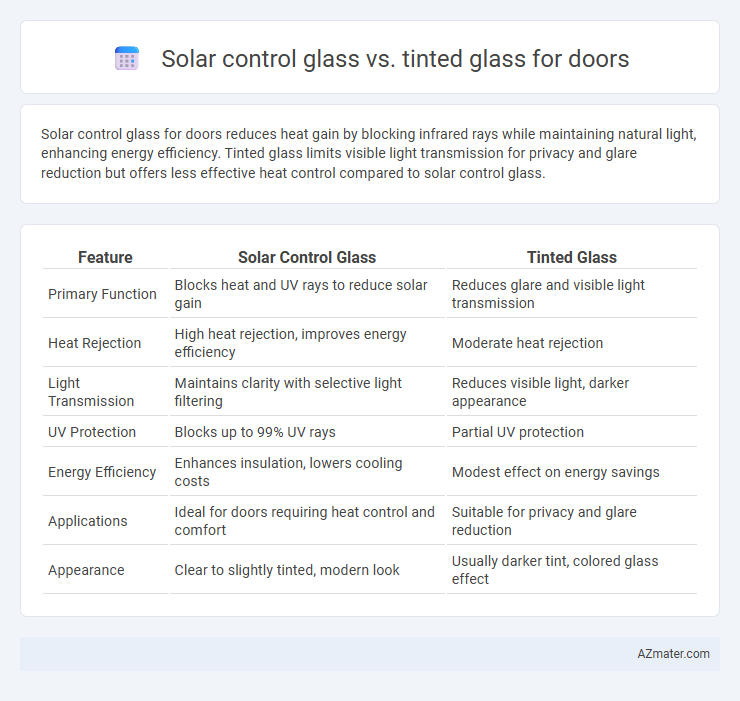Solar control glass for doors reduces heat gain by blocking infrared rays while maintaining natural light, enhancing energy efficiency. Tinted glass limits visible light transmission for privacy and glare reduction but offers less effective heat control compared to solar control glass.
Table of Comparison
| Feature | Solar Control Glass | Tinted Glass |
|---|---|---|
| Primary Function | Blocks heat and UV rays to reduce solar gain | Reduces glare and visible light transmission |
| Heat Rejection | High heat rejection, improves energy efficiency | Moderate heat rejection |
| Light Transmission | Maintains clarity with selective light filtering | Reduces visible light, darker appearance |
| UV Protection | Blocks up to 99% UV rays | Partial UV protection |
| Energy Efficiency | Enhances insulation, lowers cooling costs | Modest effect on energy savings |
| Applications | Ideal for doors requiring heat control and comfort | Suitable for privacy and glare reduction |
| Appearance | Clear to slightly tinted, modern look | Usually darker tint, colored glass effect |
Introduction to Solar Control Glass vs Tinted Glass
Solar control glass incorporates advanced coatings that selectively block ultraviolet and infrared radiation while maintaining visible light transmission, enhancing energy efficiency and indoor comfort. Tinted glass reduces visible light and glare by incorporating colorants, which can darken the glass but may also diminish natural daylight. The choice between solar control and tinted glass depends on factors like energy savings, aesthetics, and specific light filtration needs for door applications.
Understanding Solar Control Glass
Solar control glass is engineered with special coatings that reflect and absorb a significant portion of solar radiation, reducing heat transmission while maintaining clear visibility. This glass type enhances energy efficiency by minimizing cooling costs and preventing UV damage, making it ideal for doors in hot climates. Compared to tinted glass, solar control glass offers superior performance in blocking infrared rays without significantly darkening the interior space.
What is Tinted Glass?
Tinted glass is a type of glass that has been treated with a colorant to reduce glare and heat from sunlight by absorbing a portion of solar radiation. Unlike solar control glass, which is coated to reflect infrared and ultraviolet rays while maintaining visible light transmission, tinted glass primarily darkens the glass for aesthetics and shading. Tinted glass helps improve privacy and reduces eye discomfort while offering moderate energy efficiency by lowering interior temperatures.
Key Differences Between Solar Control and Tinted Glass
Solar control glass integrates a special coating that reflects infrared and UV rays, significantly reducing heat gain while maintaining high visible light transmission, whereas tinted glass absorbs solar radiation to limit glare and heat but can darken indoor spaces. Solar control glass enhances energy efficiency by minimizing cooling costs without compromising natural light, unlike tinted glass which may reduce daylight and alter color perception. The choice depends on balancing aesthetics, light management, and energy performance for door applications.
Energy Efficiency Comparison
Solar control glass reflects and absorbs significant solar radiation, reducing heat gain and lowering cooling energy consumption in buildings. Tinted glass primarily reduces visible light transmission but is less effective at blocking infrared heat, leading to higher energy use for air conditioning. Choosing solar control glass for doors enhances energy efficiency by maintaining cooler indoor temperatures and minimizing reliance on HVAC systems.
Light Transmission and Visibility
Solar control glass offers precise regulation of light transmission, typically reducing solar heat gain while maintaining high visible light transmittance, enhancing visibility without compromising energy efficiency. Tinted glass, on the other hand, lowers visible light transmission by darkening the glass, which reduces glare but can significantly diminish clarity and visibility through the door. Choosing between the two depends on the balance needed between natural light, external view clarity, and heat control for indoor comfort.
Aesthetic Impact on Door Design
Solar control glass enhances door design by providing a sleek, modern aesthetic with its neutral and reflective surface that subtly reduces glare while maintaining clear visibility. Tinted glass offers a more pronounced aesthetic impact through its darker hues, creating a bold and privacy-focused look that can complement various architectural styles. Both options influence the door's appearance by balancing light transmission and style, with solar control glass favored for a high-tech, minimalistic finish and tinted glass preferred for dramatic, shaded effects.
UV Protection and Indoor Comfort
Solar control glass significantly reduces UV radiation, blocking up to 99% of harmful rays, which protects interior furnishings from fading and enhances indoor comfort by minimizing heat gain. Tinted glass provides moderate UV protection by absorbing sunlight, but it can reduce natural light and alter color perception, potentially affecting indoor ambiance. Solar control glass maintains clearer visibility and offers superior thermal insulation, making it a more effective solution for doors in managing UV exposure and maintaining comfortable indoor temperatures.
Cost Considerations for Both Glass Types
Solar control glass typically incurs a higher initial cost compared to tinted glass due to its advanced coatings designed to reflect infrared and UV rays, enhancing energy efficiency and reducing cooling expenses over time. Tinted glass offers a more affordable upfront option by simply absorbing solar radiation, but it may lack the long-term energy savings associated with solar control technology. When budgeting for door installations, evaluating both the initial investment and potential utility savings is crucial to determine the cost-effectiveness of solar control versus tinted glass.
Choosing the Best Glass for Your Door Needs
Solar control glass significantly reduces heat gain by reflecting infrared rays, enhancing energy efficiency and indoor comfort, making it ideal for doors in sunny climates. Tinted glass offers moderate heat reduction and glare control by absorbing sunlight, providing privacy with various color options but less effective heat management than solar control glass. Choosing the best glass depends on priority factors such as energy savings, privacy, glare reduction, and aesthetic preference for your door's location and usage.

Infographic: Solar control glass vs Tinted glass for Door
 azmater.com
azmater.com